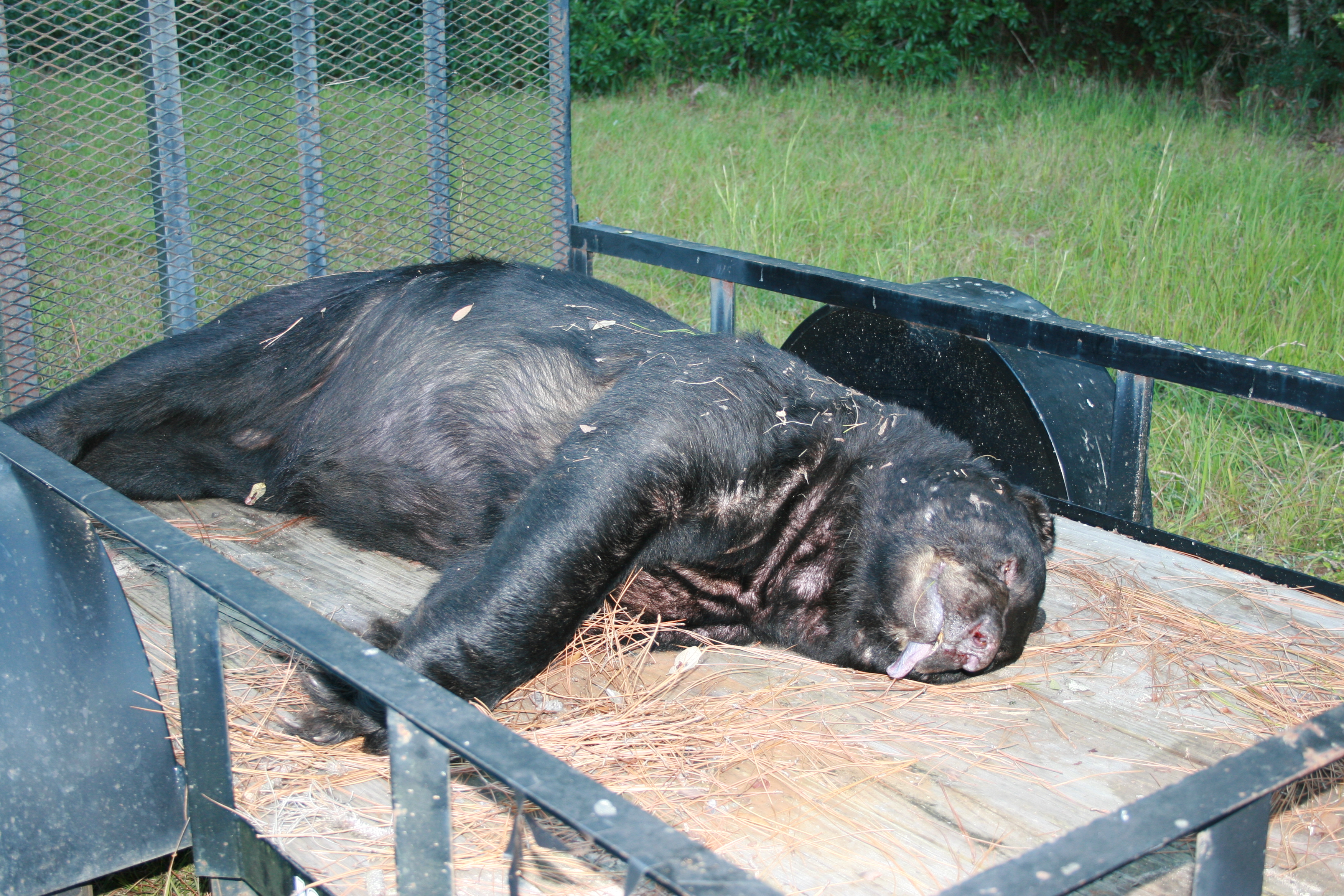
A 475-pound bear, pictured, was shot and killed October 20 in Navarre. A second bear was also shot and killed October 27 near Blackwater River State Forest. According to FWC, shooting a bear is a second-degree misdemeanor punishable by a $500 fine and/or 60 days in jail along with six months probation.
Santa Rosa County Commissioners on Monday plan to discuss a letter drafted by County Attorney Roy Andrews to the Florida Fish & Wildlife Conservation Commission, seeking action to reduce bear encounters in Santa Rosa County — through population reduction if necessary.
Commissioner Bob Cole in the past has suggested FWC issue hunting permits for male bears, but the state in April decided not to reconsider bear hunts until 2019.
In the October 30 letter drafted to FWC Chairman Brian Yablonski, Andrews said the board recently addressed the “rapidly escalating number of human/bear encounters” in the county.
“It is apparent from the tremendous increase in bear sighting in areas that have not been part of the historic range of bears that the population of bears is rapidly multiplying. The increased incident of bear encounters creates a present danger to the citizens of Santa Rosa County,” states the letter. “It is incumbent upon the Florida Fish and Wildlife Conservation Commission to take action to reduce the danger, by population if necessary.”
According to FWC, since the 1980s, the black bear population has been expanding along with our human population.
However, while the human population has skyrocketed from 5 million residents in 1960 to 20 million today with a projected further increase to almost 36 million by 2060, the bear population has only seen a 50 percent increase — up to 4,050 statewide.
The population estimate for the West Panhandle region has increased from around 80 bears in 2002 to 120 in 2015.
“Urban sprawl is encroaching on traditionally remote areas, bringing people into prime bear habitat. As a result, bears and people are encountering each other more than ever,” states the FWC bear facts webpage, which recommends reducing bear encounters by securing food sources like garbage, pet food, and bird seed.
“As bears become more active in the fall, they take the path of least resistance to find food,” said Dave Telesco, who leads the FWC’s Bear Management Program. “This draws them into neighborhoods and areas with convenient food sources, which can be dangerous for people. While the FWC continues to work with local communities to reduce human-bear conflicts, it is important for Floridians to understand the steps they can take to keep themselves safe.”
FWC recommends securing household garbage in a sturdy shed, garage or bear-resistant containers/dumpsters and waiting to put out household garbage until the morning of pickup rather than the night before. Additionally, FWC has encouraged homeowners association or local governments to institute ordinances on keeping foods that attract wildlife secure.
Although Santa Rosa County Commissioners did enact an ordinance in October 2016, tightening restrictions on the use of non-bear resistant trash containers to make the county eligible for Bear Wise funding to purchase bear-resistant containers, the county has not purchased any.
“The county has not purchased nor distributed any bear-resistant containers to residents however they are available to the residents through their waste hauler,” Santa Rosa County Public Information Office Brandi Whitehurst on Nov. 3 told South Santa Rosa News.
At the time the county passed the ordinance back in 2016, Andrews stated a “huge” part of the motivation to enact it was to become eligible for grants to help fund the county’s purchase bear-resistant trash containers citizens could request.
The county subsequently applied for Bear Wise funding and was awarded $150,000 but in January 2017 rejected the state money because the grant required a $150,000 match, and citizens would have to pay for a portion of their trash-resistant containers.
That same ordinance also enabled the county to issue $120 fines for non-compliance, but the county instead has referred those who do not adhere to the tighter garbage restrictions to FWC.
“If there is a complaint of a resident not adhering to the ordinance, we make initial contact with the resident and ask them to comply. If they do not comply, we refer them to the Florida Fish and Wildlife Conservation Commission. I do not have an exact number but can say that we have only turned over a few.” stated Whitehurst.
County Commmissioners next week are also expected to send an endorsement letter for The Holley By The Sea Homeowners Association’s application for Bear Wise funding. That application seeks to retrofit 3,700 trash cans in accordance with FWC guidelines with hardware provided from $82,250 in FWC grant funds. The association is using “in-kind” work by HOA staff and residents to meet the $12,230 match requirement.





































